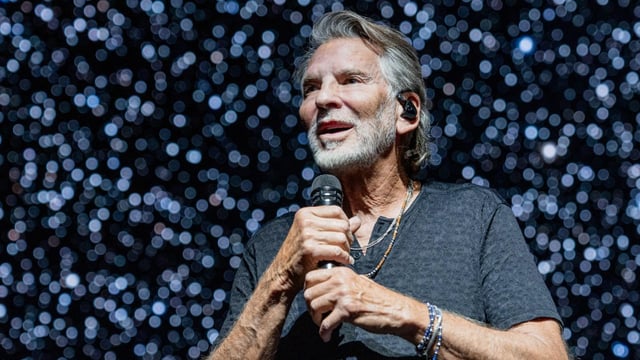When the ‘Danger Zone’ Becomes a Political Minefield: Kenny Loggins Takes a Stand
Kenny Loggins, the voice that soared through the skies with Maverick and Goose in Top Gun, isn’t afraid to enter a different kind of danger zone. Recently, the legendary singer-songwriter has publicly and forcefully demanded the removal of his iconic song, “Danger Zone,” from an AI-generated video depicting a U.S. President (widely interpreted as Donald Trump) dumping what appears to be excrement on a crowd of protesters. This incident throws a spotlight on the increasingly complex intersection of AI, music licensing, political satire, and artistic integrity. It also raises critical questions about the responsibilities of artists in the age of deepfakes and manipulated media.
The video, which rapidly circulated online, sparked immediate controversy. While some found it to be a humorous, albeit crude, form of political commentary, others deemed it offensive and inappropriate. Loggins’ objection, however, wasn’t necessarily about the political message itself, but rather the unauthorized and, in his view, damaging association of his music with it.
Copyright, AI, and the Wild West of Digital Content
The Legal Gray Area: Can AI Use Music Without Permission?
The heart of the issue lies in copyright law and its application to AI-generated content. Currently, the legal landscape surrounding AI’s use of copyrighted material is murky at best. While existing copyright laws protect musical compositions and recordings, the extent to which these protections apply to AI systems that “learn” from and potentially replicate elements of those works remains a subject of intense debate. If an AI is trained on a vast library of songs, can it then generate new music that infringes on existing copyrights? That’s the million-dollar question.
Loggins’ demand highlights the vulnerability of artists in this new digital frontier. He, like many musicians, relies on copyright protection to control the use of his work and generate income. When AI is used to create content that misappropriates his music, it directly undermines his rights and financial interests. It also poses a threat to the value of artistic creation in general.
Beyond Legality: The Ethical Considerations
Even if the use of “Danger Zone” in the AI video were to fall into some legal gray area (such as fair use or parody), there are still significant ethical considerations. Artists have a right to control how their work is perceived and associated with other content. Linking a song like “Danger Zone,” with its generally positive and energetic associations, to a highly divisive and arguably offensive political message can irreparably damage the artist’s brand and reputation.
This situation also raises broader ethical questions about the creation and dissemination of AI-generated content, particularly when it involves political figures and sensitive topics. The ability to create hyper-realistic deepfakes and manipulated media has the potential to spread misinformation, incite violence, and undermine public trust in institutions. The responsibility for preventing such abuse lies not only with the creators of AI technology but also with the platforms that host and distribute this content.
The Power of Association: Protecting Artistic Integrity
More Than Just a Song: The Brand Kenny Loggins
“Danger Zone” is far more than just a song; it’s a cultural touchstone. It evokes feelings of exhilaration, adventure, and even a touch of youthful rebellion. It’s inextricably linked to the iconic film Top Gun and has been used in countless commercials, movies, and TV shows to convey a sense of excitement and energy. This carefully cultivated brand image is incredibly valuable to Kenny Loggins. By associating the song with a controversial and potentially offensive political video, the video’s creator risked tarnishing that image.
Loggins’ forceful response demonstrates the importance of artists protecting their artistic integrity. He is sending a clear message that he will not allow his work to be used in ways that contradict his values or damage his reputation. His stand could inspire other artists to be more proactive in defending their rights in the face of AI-generated content.
Setting a Precedent: What This Means for the Future
The outcome of this particular case could set a significant precedent for how copyright law is interpreted and enforced in the age of AI. If Loggins is successful in getting the video removed or altered, it could empower other artists to take similar action against unauthorized uses of their work in AI-generated content. Conversely, if the video remains online, it could embolden others to push the boundaries of what is legally and ethically permissible.
Ultimately, the case highlights the urgent need for clearer legal frameworks and industry guidelines to govern the use of copyrighted material by AI systems. Without such safeguards, artists will continue to be vulnerable to exploitation, and the creative landscape could become increasingly chaotic and unpredictable.
Moving Forward: Finding a Balance Between Innovation and Protection
The rise of AI presents both exciting opportunities and daunting challenges for the music industry. While AI can be a powerful tool for creating new music and enhancing existing works, it also poses a significant threat to artists’ rights and livelihoods. Finding a balance between fostering innovation and protecting artistic integrity is crucial.
This balance will require collaboration between artists, technology companies, legal experts, and policymakers. Clearer copyright laws are needed to address the specific challenges posed by AI. Industry-wide standards for licensing and attribution are also essential. Furthermore, platforms that host AI-generated content need to implement robust mechanisms for detecting and removing infringing material.
Kenny Loggins’ demand is a wake-up call. It’s a reminder that technology should serve art, not the other way around. As we navigate the uncharted waters of AI, it’s imperative that we prioritize the rights and interests of artists and ensure that their voices continue to be heard.
